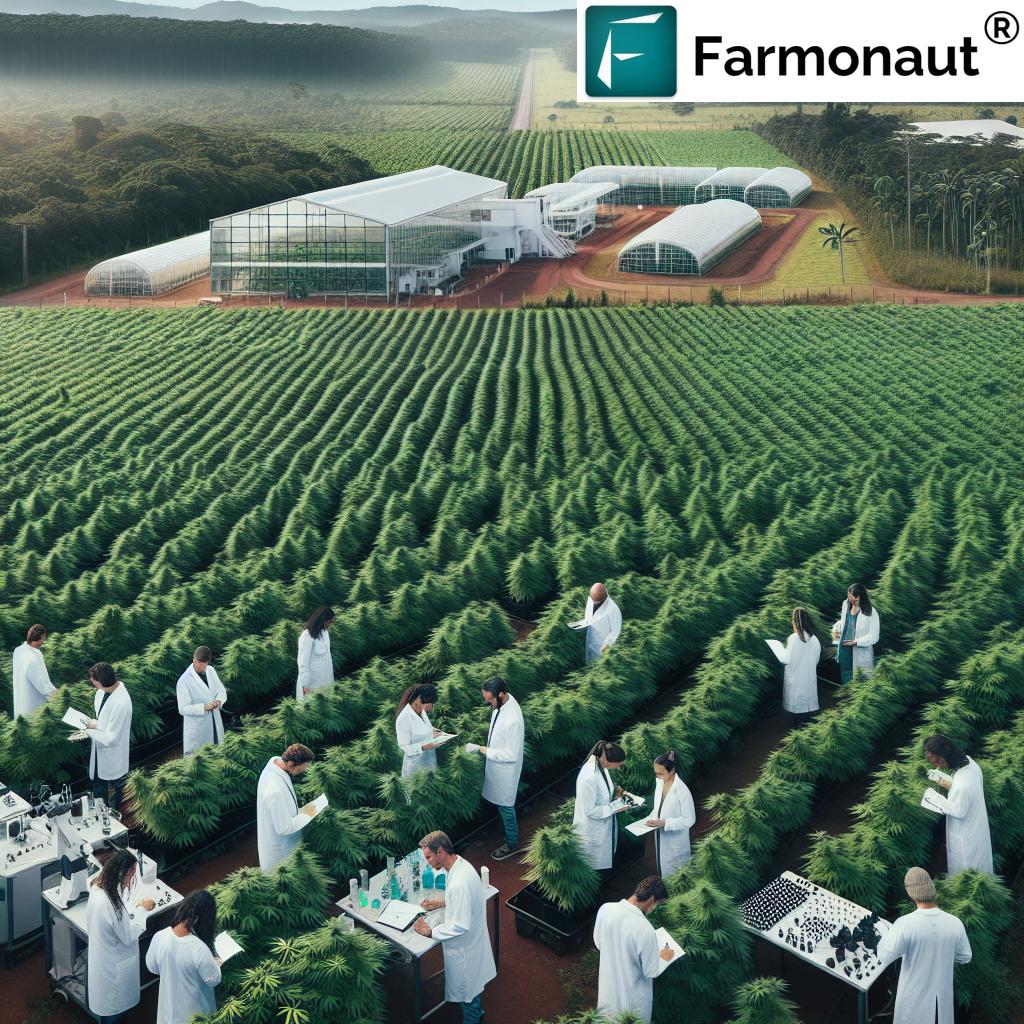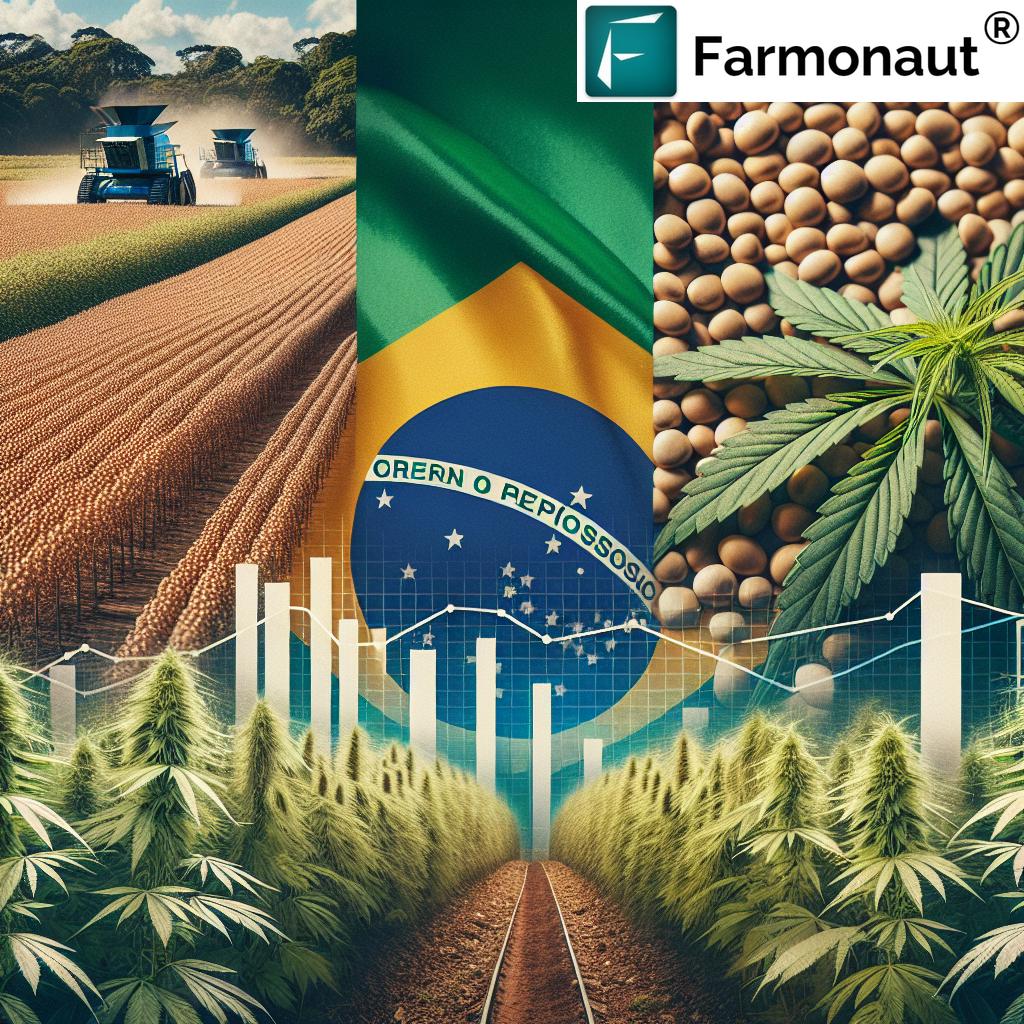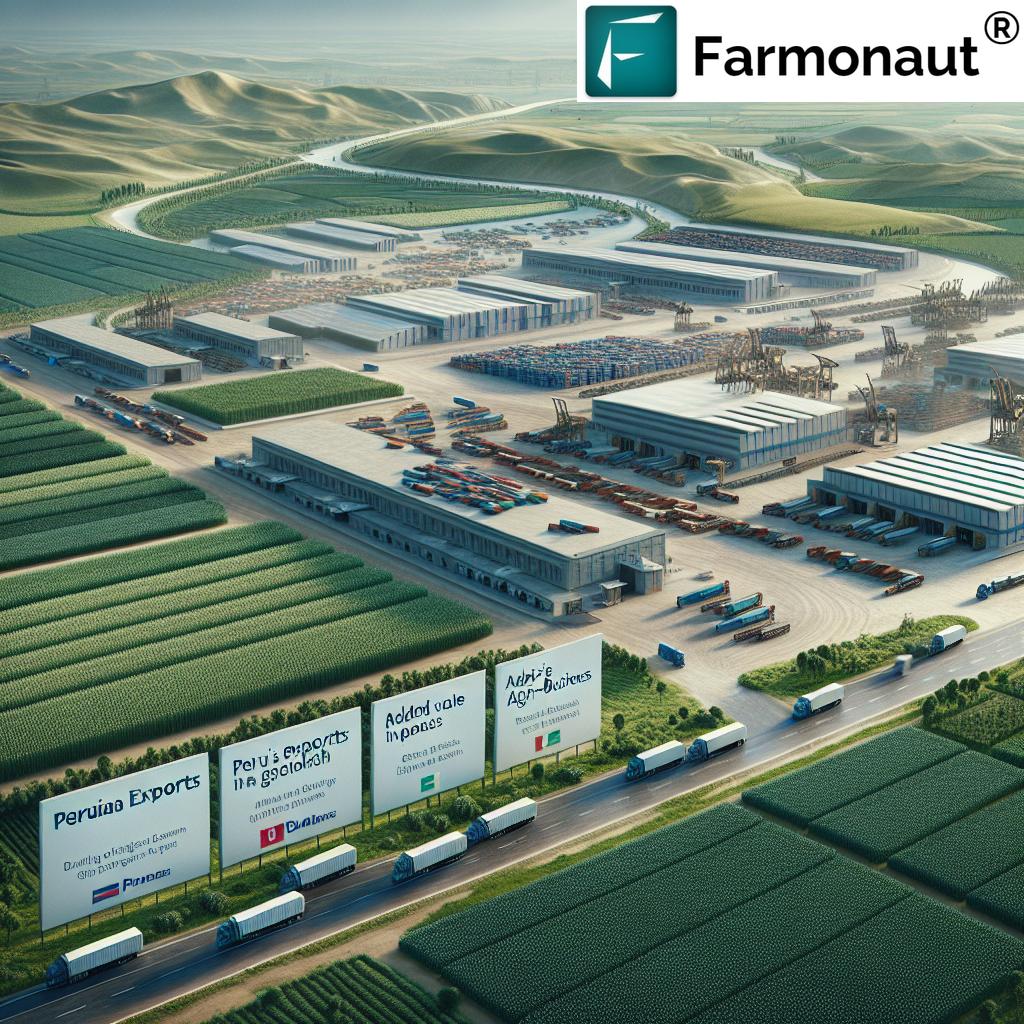Brazil’s Agricultural Revolution: Pioneering Hemp Research and Cultivation for Sustainable Farming
“Brazil’s 12-year cannabis research program aims to develop a seed bank and adapt varieties to Brazilian soil.”
Welcome to our comprehensive exploration of Brazil’s groundbreaking journey into hemp research and cultivation. As we delve into this exciting new frontier of agricultural innovation, we’ll uncover how South America’s largest country is poised to revolutionize the cannabis industry and potentially become a global leader in hemp production.
In this blog post, we’ll examine the ambitious 12-year research program initiated by Embrapa, Brazil’s renowned agricultural research agency, and its potential to transform the country’s farming landscape. We’ll explore the various aspects of this pioneering initiative, from developing a cannabis seed bank to adapting varieties for Brazilian soil and identifying regional production hubs.
The Genesis of Brazil’s Hemp Research Program
Brazil, long known for its agricultural prowess, particularly in soybean farming, is now setting its sights on a new crop with immense potential: hemp. The country’s agricultural research agency, Embrapa, which played a pivotal role in turning Brazil into a leading grains exporter, is now preparing to apply its expertise to cannabis cultivation.
According to recent reports from Reuters in Sao Paulo, Embrapa is gearing up for a 12-year research program that could potentially replicate Brazil’s success in grain production within the realm of cannabis cultivation. This ambitious initiative is expected to receive the green light from Anvisa, Brazil’s health agency, later this year.

The significance of this research program cannot be overstated. As Daniela Bittencourt, a researcher with Embrapa’s cannabis work group, aptly puts it: “Can you imagine if we had already carried out the genetic improvement of this plant like we’ve done with cotton in the last 50 years?” This statement underscores the vast potential that lies in applying Brazil’s agricultural expertise to hemp cultivation.
Key Objectives of the Research Program
Embrapa’s research program is comprehensive and ambitious, with several key objectives:
- Creating a Cannabis Seed Bank: This will serve as a repository of genetic diversity, crucial for breeding programs and developing new varieties.
- Adapting Varieties to Brazilian Soil and Climate: Brazil’s tropical climate presents unique challenges and opportunities for hemp cultivation. The research aims to develop varieties that thrive in these conditions.
- Identifying Regional Production Hubs: By mapping out the most suitable areas for hemp cultivation across Brazil, the program will help establish efficient production centers.
- Exploring Innovative Agricultural Practices: This includes investigating the potential of hemp in crop rotation systems and its capacity for carbon sequestration.
These objectives highlight the multifaceted approach of Brazil’s hemp research program, aiming not just at cultivation but at creating a sustainable and economically viable hemp industry.
The Potential Impact on Brazil’s Agricultural Landscape
The implications of this research program for Brazil’s agricultural sector are profound. Just as Embrapa’s efforts since the 1970s led to a tenfold increase in Brazil’s soy output, making it the world’s largest producer, similar success in hemp cultivation could position Brazil as a global leader in this burgeoning industry.
Farmonaut, a pioneering agricultural technology company, offers valuable insights into how such research programs can benefit from advanced farm management solutions. Through its satellite-based crop health monitoring and AI-driven advisory systems, Farmonaut provides tools that could significantly enhance the efficiency and productivity of hemp cultivation efforts.
The potential applications of hemp are vast, ranging from medicinal use to food products, textiles, and industrial materials. This diversity of applications opens up numerous opportunities for economic growth and innovation within Brazil’s agricultural sector.
Brazil’s Regulatory Landscape for Hemp Cultivation
The legal framework for hemp cultivation in Brazil is evolving rapidly. A significant milestone was reached in November when a Brazilian higher court ruling legalized the planting of hemp, a type of cannabis with less than 0.3% THC, for medicinal purposes. This ruling gave Anvisa until May to establish regulations, setting the stage for the expansion of hemp cultivation in Brazil.
It’s important to note that while this ruling opens the door for hemp cultivation, recreational marijuana sale remains illegal in Brazil. This distinguishes Brazil’s approach from countries like Uruguay and Canada in the Western Hemisphere, which have fully legalized cannabis.
The Global Context: Brazil’s Potential in the World Hemp Market
To understand the significance of Brazil’s entry into hemp cultivation, it’s crucial to consider the global context. Currently, China is the world’s largest producer and exporter of hemp, according to academic research. Other countries like France and Paraguay have also authorized cultivation for industrial and medicinal purposes.
Brazil’s entry into this market could significantly alter the global hemp landscape. With its vast agricultural expertise, favorable climate, and extensive land resources, Brazil has the potential to become a major player in the hemp industry, possibly rivaling or even surpassing current leaders.
“Brazil’s success in soybean farming could be replicated in hemp production, potentially making it a global leader.”
Innovative Agricultural Practices in Hemp Cultivation
One of the most exciting aspects of Brazil’s hemp research program is its focus on innovative agricultural practices. Two areas of particular interest are crop rotation and carbon sequestration.
Crop Rotation with Hemp
Hemp’s potential in crop rotation systems is significant. As a fast-growing plant with deep roots, hemp can help improve soil structure, reduce erosion, and suppress weeds. When incorporated into rotation with other crops, hemp can contribute to more sustainable farming practices and potentially increase overall farm productivity.
Farmonaut’s advanced satellite-based crop monitoring system could play a crucial role in optimizing these crop rotation strategies. By providing real-time data on crop health and soil conditions, Farmonaut’s technology can help farmers make informed decisions about when and where to incorporate hemp into their rotation cycles.
Explore Farmonaut’s API for advanced agricultural insights
Carbon Sequestration Potential of Hemp
Another exciting area of research is hemp’s potential for carbon sequestration. Hemp plants are known for their rapid growth and ability to absorb significant amounts of CO2 from the atmosphere. This makes hemp cultivation a potentially valuable tool in the fight against climate change.
Brazil’s research into this aspect of hemp cultivation could lead to innovative farming practices that not only produce valuable crops but also contribute to reducing greenhouse gas emissions. This aligns perfectly with global efforts towards more sustainable and environmentally friendly agricultural practices.

The Role of Technology in Brazil’s Hemp Research
As Brazil embarks on this ambitious hemp research program, the role of advanced agricultural technology cannot be overstated. Companies like Farmonaut are at the forefront of this technological revolution in agriculture, offering tools and insights that can significantly enhance research efforts and cultivation practices.
Farmonaut’s satellite-based crop health monitoring system, for instance, can provide researchers and farmers with real-time data on plant health, soil moisture levels, and other critical metrics. This information is invaluable for optimizing growing conditions and developing hemp varieties best suited to Brazil’s diverse climate zones.
Moreover, Farmonaut’s AI-driven advisory system, Jeevn AI, could offer personalized recommendations for hemp cultivation based on local conditions and global best practices. This integration of artificial intelligence into agricultural research and practice represents a significant leap forward in precision farming.
Check out Farmonaut’s API Developer Docs for in-depth technical information
Economic Implications of Brazil’s Hemp Industry Development
The development of a robust hemp industry in Brazil has far-reaching economic implications. As we’ve seen with Brazil’s success in soybean farming, becoming a major player in a global agricultural market can significantly boost a country’s economy.
Here are some potential economic benefits of Brazil’s hemp industry development:
- Job Creation: From farming to processing and product development, the hemp industry could create numerous jobs across various sectors.
- Export Opportunities: As a potential major producer, Brazil could become a significant exporter of hemp and hemp-derived products.
- Diversification of Agricultural Output: Hemp provides an opportunity for farmers to diversify their crops, potentially increasing their resilience to market fluctuations.
- Development of New Industries: The versatility of hemp could spur the development of new industries in Brazil, from textiles to bioplastics.
Farmonaut’s blockchain-based traceability solutions could play a crucial role in ensuring the transparency and authenticity of Brazil’s hemp supply chain, potentially increasing the value and trustworthiness of Brazilian hemp products in the global market.
Environmental Sustainability and Hemp Cultivation
One of the most promising aspects of Brazil’s foray into hemp cultivation is its potential to contribute to environmental sustainability. Hemp is known for its environmentally friendly characteristics, which align well with global efforts to combat climate change and promote sustainable agriculture.
Here are some key environmental benefits of hemp cultivation:
- Low Water Requirements: Compared to many other crops, hemp requires relatively little water to grow, making it suitable for sustainable farming in water-scarce regions.
- Minimal Pesticide Use: Hemp is naturally resistant to many pests, reducing the need for harmful pesticides.
- Soil Improvement: Hemp’s deep root system can help prevent soil erosion and improve soil health over time.
- Biodegradable Products: Many hemp-derived products are biodegradable, offering eco-friendly alternatives to synthetic materials.
Farmonaut’s technology can support these sustainability efforts by providing farmers with precise data on resource usage and environmental impact. For instance, Farmonaut’s carbon footprinting feature could help hemp farmers monitor and reduce their environmental impact, aligning with global sustainability goals.
Challenges and Opportunities in Brazil’s Hemp Research Program
While the potential benefits of Brazil’s hemp research program are significant, it’s important to acknowledge the challenges that lie ahead. These challenges, however, also present opportunities for innovation and growth.
Challenges:
- Regulatory Hurdles: Navigating the evolving legal landscape for hemp cultivation in Brazil will require careful attention and adaptability.
- Public Perception: Educating the public about the differences between hemp and marijuana will be crucial for widespread acceptance.
- Infrastructure Development: Building the necessary infrastructure for large-scale hemp production and processing will require significant investment.
- Competition: Entering a global market with established players like China will present competitive challenges.
Opportunities:
- Technological Innovation: The research program presents opportunities for developing new technologies in agriculture and processing.
- Economic Growth: Successfully establishing a hemp industry could create new economic opportunities across various sectors.
- Sustainable Agriculture: Hemp cultivation could contribute to more sustainable farming practices in Brazil.
- Global Leadership: Brazil has the potential to become a global leader in hemp research and production.
Farmonaut’s advanced agricultural solutions can help address many of these challenges. For instance, its AI-driven advisory system can assist farmers in optimizing their hemp cultivation practices, while its blockchain-based traceability solutions can help build trust in Brazilian hemp products in the global market.
The Future of Hemp in Brazil: A Vision for Sustainable Growth
As we look to the future, the potential for hemp cultivation in Brazil appears bright. The country’s vast agricultural expertise, combined with its favorable climate and the innovative research program led by Embrapa, positions Brazil to become a significant player in the global hemp industry.
We envision a future where hemp becomes an integral part of Brazil’s agricultural landscape, contributing to sustainable farming practices, economic growth, and environmental conservation. From textiles to food products, from construction materials to biofuels, the versatility of hemp could spark innovation across numerous industries in Brazil.
The success of this vision will depend on continued research, technological innovation, and supportive policies. Companies like Farmonaut, with their advanced agricultural technologies, will play a crucial role in realizing this potential, helping to optimize cultivation practices and ensure the sustainability and traceability of Brazil’s hemp industry.
Brazil’s Hemp Research Program Milestones
| Year | Milestone | Potential Impact |
|---|---|---|
| 2024 | Initiation of research program | Establishment of research framework and objectives |
| 2026 | Development of cannabis seed bank | Preservation of genetic diversity for future breeding programs |
| 2028 | Adaptation of hemp varieties to Brazilian soil | Improved crop yields and resilience in local conditions |
| 2030 | Identification of regional production hubs | Optimized cultivation areas leading to increased efficiency |
| 2032 | Implementation of innovative agricultural practices | Enhanced sustainability and productivity in hemp farming |
| 2035 | Completion of research program | Brazil positioned as a global leader in hemp production and research |
Conclusion: Brazil’s Green Revolution in Hemp
Brazil’s ambitious 12-year research program into hemp cultivation represents a significant step towards a more diverse, sustainable, and innovative agricultural sector. By leveraging its vast experience in agricultural research and embracing cutting-edge technologies, Brazil is poised to become a major player in the global hemp industry.
The potential benefits of this research program extend far beyond agriculture. From economic growth to environmental sustainability, from medical applications to industrial innovations, the ripple effects of Brazil’s hemp revolution could be transformative.
As we watch this exciting journey unfold, it’s clear that the future of agriculture in Brazil – and indeed, globally – is green, sustainable, and full of potential. With continued research, technological innovation, and supportive policies, Brazil’s hemp industry could soon be rivaling its soybean success, contributing to a more sustainable and prosperous future for all.
Earn With Farmonaut: Affiliate Program
Earn 20% recurring commission with Farmonaut’s affiliate program by sharing your promo code and helping farmers save 10%. Onboard 10 Elite farmers monthly to earn a minimum of $148,000 annually—start now and grow your income!
FAQs about Brazil’s Hemp Research and Cultivation
- Q: What is the main goal of Brazil’s hemp research program?
A: The main goal is to develop a cannabis seed bank, adapt hemp varieties to Brazilian soil, and identify regional production hubs to establish Brazil as a significant player in the global hemp industry. - Q: Is recreational marijuana use legal in Brazil?
A: No, recreational marijuana sale remains illegal in Brazil. The recent court ruling only legalized the planting of hemp (cannabis with less than 0.3% THC) for medicinal purposes. - Q: How long is Brazil’s hemp research program expected to last?
A: The research program is planned to span 12 years, allowing for comprehensive study and development of hemp cultivation practices in Brazil. - Q: What are some potential applications of hemp that Brazil is exploring?
A: Brazil is exploring various applications of hemp, including medicinal use, food products, textiles, industrial materials, and its potential for crop rotation and carbon sequestration. - Q: How does Brazil’s climate affect hemp cultivation?
A: Brazil’s tropical climate presents unique challenges and opportunities for hemp cultivation. The research program aims to develop hemp varieties that can thrive in these specific conditions.
















